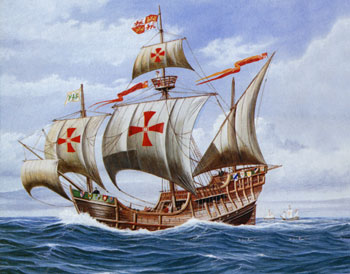__
Top 5 Misconceptions About Columbus
 1. Columbus set out to prove the world was round. If he did, he was about 2,000 years too late. Ancient Greek mathematicians had already proven that the Earth was round, not flat. Pythagoras in the sixth century B.C.E. was one of the originators of the idea. Aristotle in the fourth century B.C.E. provided the physical evidence, such as the shadow of the Earth on the moon and the curvature of the Earth known by all sailors approaching land. And by the third century B.C.E., Eratosthenes determined the Earth's shape and circumference using basic geometry. In the second century C.E., Claudius Ptolemy wrote the "Almagest," the mathematical and astronomical treatise on planetary shapes and motions, describing the spherical Earth. This text was well known throughout educated Europe in Columbus' time.
1. Columbus set out to prove the world was round. If he did, he was about 2,000 years too late. Ancient Greek mathematicians had already proven that the Earth was round, not flat. Pythagoras in the sixth century B.C.E. was one of the originators of the idea. Aristotle in the fourth century B.C.E. provided the physical evidence, such as the shadow of the Earth on the moon and the curvature of the Earth known by all sailors approaching land. And by the third century B.C.E., Eratosthenes determined the Earth's shape and circumference using basic geometry. In the second century C.E., Claudius Ptolemy wrote the "Almagest," the mathematical and astronomical treatise on planetary shapes and motions, describing the spherical Earth. This text was well known throughout educated Europe in Columbus' time.
2. Columbus discovered America. Yes, let's ignore the fact that millions of humans already inhabited this land later to be called the Americas, having discovered it millennia before. And let's ignore that whole Leif Ericson voyage to Greenland and modern-day Canada around 1000 C.M.E. If Columbus discovered America, he himself didn't know. Until his death he claimed to have landed in Asia, even though most navigators knew he didn't.
3. Columbus introduced syphilis to Europe. This is hotly debated. Syphilis was presented in pre-Columbus America. Yet syphilis likely existed for millennia in Europe, as well, but simply wasn't well understood.
4. Columbus died unknown in poverty. Columbus wasn't a rich man when he died in Spain at age 54 in 1506. But he wasn't impoverished. He was living comfortably, economically speaking, in an apartment in Valladolid, Crown of Castile, in present-day Spain, albeit in pain from severe arthritis.
5. Columbus did nothing significant. While Columbus was wrong about most things, he did help establish knowledge about trade winds, namely the lower-latitude easterlies that blow toward the Caribbean and the higher-latitude westerlies that can blow a ship back to Western Europe. Also, while Columbus wasn't the first European to reach the Western Hemisphere, he was the first European to stay. His voyages directly initiated a permanent presence of Europeans in both North and South America.
___
The entire post can be read here.
No comments:
Post a Comment